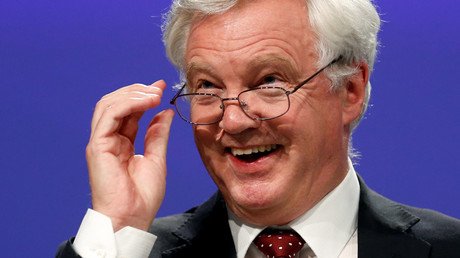Juncker’s Brexit ‘warning’: What he ACTUALLY said & what the UK media reported
His speech was 6,000 words long – but just five of them made the news in the UK.
Not even Jean Claude Juncker’s whole sentence hit the headlines, just a part which made Brexit sound like a jail sentence and Brussels look like a smug divorcee.
“You will regret it soon,” EU chief Juncker said about Brexit.
But what was taken out of context and made to sound like an ominous warning, or even distorted into a threat, actually came after the Brussels boss said it was the EU which will be suffering Brexit remorse.
Juncker, the president of the European Commission, unsurprisingly and unashamedly heaped praise on Brussels in his ‘State of the Union’ address in Strasbourg on Wednesday.
He called for greater unity, the rejection of nationalism, and deeper ties from EU budgetary powers to institutions and foreign policy.
And he talked about Brexit.
The European Parliament gathered for the speech, eagerly awaiting news on the divorce between Britain and Brussels, which Juncker touched on briefly.
Nevertheless, what little did come was seized upon.
The BBC was quick to pounce on the part where the President said the EU – and the UK – would regret the split.
Significantly, the corporation chose to use only half of his sentence, turning a prediction of remorse into a menacing threat.
“Brexit: UK will 'soon regret' leaving EU argues Juncker,” the online headline read.
The Independent website went further, when they labeled it a ‘warning’.
“Brexit: Britain will regret leaving the European Union, warns EU president Jean-Claude Juncker,” the website claimed.
Even the Gibraltar Chronicle decided to ignore the EU’s regret at not being able to prevent the split.
“Britain will soon regret voting for Brexit: Juncker,” the headline read.
Although the quotes were carried in full, the chosen headlines were used as worrying click-bait.
Juncker actually opened his sentence by expressing regret from the EU, because Britain’s departure will have a negative effect on the bloc.
A huge funding gap will be left by the UK, and a no-deal break would mean massive export losses for major countries like Germany and France.
There could also be a hole in intelligence sharing and combined defence strategies.
All of which the Union was given a chance to preserve in the pre-referendum negotiations with the then Prime Minister David Cameron.
What did Juncker actually say?
Well, here it is.
"March 29th 2019. That will be the date when the United Kingdom will leave the European Union.
https://t.co/w5TaXbkeoy Juncker not threatening but showing humility. Misleading @BBCNews headline. They should be better than this.
— Julian Tooke (@JulianTooke) September 13, 2017
“This will be a very sad and tragic moment in our history – we will always regret this, and I think that you will regret it soon, if I might say," he said.
"Nonetheless we have to respect the will of the British people, but we will have to make progress, we will move on, because Brexit isn’t everything – it’s not the future of Europe."
Mr Juncker went on a tangent with the last part of his speech – the hardcopy of the speech released publicly ended at “we will always regret this”.
Addressing Britain was his personal ad lib.
Social media users picked up on the attempt to adapt the tone of the address.
#Irresponsible#journalism from the #BBC. The strapline shows a threat that simply isn't intended! https://t.co/JzjBJhnbe2
— Poker-chips-ahoy (@amanda_vegas) September 13, 2017
“Irresponsible journalism from the BBC,” one user said.
“The strapline shows a threat that simply isn't intended!”
“Again, half the article is about what [Farage] has to say instead of report on Juncker's speech,” one user wrote about the BBC article.
“And the quote in the headline is distorted.”
A confident Juncker brushed over the Brexit regret and said that in the wake of the exit, the EU should become a closer union, sharing intelligence, currency, defence strategies and knocking down borders.
“It should be the moment we come together to take the decisions needed for a more united, stronger and democratic Europe,” he said.













